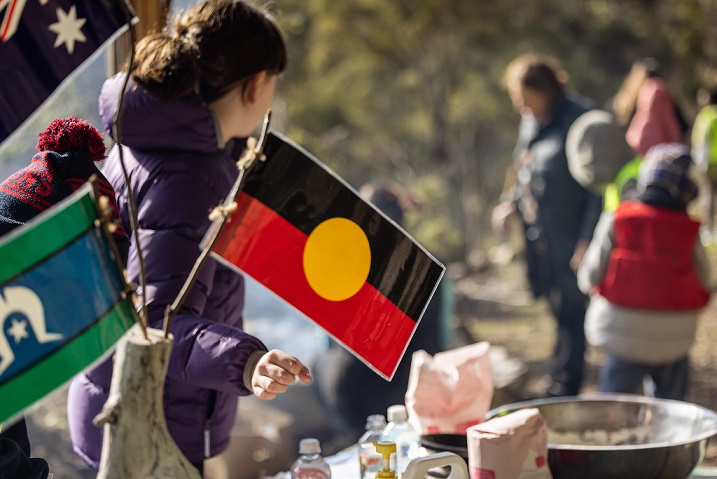
A suite of resources have been released to help Australian teachers improve cultural responsiveness in and outside of their classrooms.
The resources, developed by Be You, the national mental health and wellbeing in education initiative, invite genuine connection with Aboriginal and Torres Strait Islander children, young people, families and communities by supporting educators to create inclusive spaces where cultural diversity is celebrated.
Nina Ross, Senior Officer Professional Learning Curriculum at Narragunnawali, Reconciliation in Education, was part of a panel of First Nations Peoples that helped co-design the project with Be You.
“I think the resources are very much needed,” she said.
“This was a special thing to be a part of, as an Aboriginal person but also as a non-Aboriginal or non-Indigenous person. We are all connected, and we can be a much richer, healthier and sustainable population when we respectfully engage with First Nations brothers and sisters.”
Ross added that working on the project panel alongside Be You and First Nations Peoples was a rewarding experience, particularly when listening to their shared stories about children and young people.
“I felt heard, I felt valued, and I felt useful to help create resources that will support many, many educators,” she said.
“With updates to the Early Years Learning Framework, new version of the National Curriculum and the current social and political change happening right now in Australia, educators need this resource to help with conversations and relationship building.”
‘Be prepared to step back and really listen to each other’
Juanita Wilson, Inclusion and Equity Advisor First Nations Communities at Beyond Blue, was part of the working group discussions with the First Nations Panel.
She said there are some effective ways schools can use the resources to engage in guided self-reflection to foster respectful and meaningful connections with First Nations communities.
“As a first step we recommend educators downloading the Australian Institute for Teaching and School Leadership’s intercultural framework and tools,” Wilson told The Educator.
“Self-reflection is so important before learning about First Nations perspectives. This framework helps you to reflect deeply on assumptions, attitudes and biases about Aboriginal and Torres Strait Islander Peoples, histories, languages and cultures.”
Wilson said emphasised the importance of open and honest communications in schools that, while daunting at first, can lead to deeper understandings between people.
“At your school, be prepared to step back and really listen to each other. This may lead to some difficult conversations, but remember you’re not challenging people, but sharing ideas,” she said.
“Self-care is also important during reflection. Educators might feel uncomfortable or challenged when engaging with the AITSL tools. But by sitting in the uncomfortable spaces and reflecting we can learn more about our true history.”
Building mutually respectful relationships
Wilson said music and art experiences can be a great way for educators to celebrate and include culture in their school’s curriculum.
“The Reflect, Respect, Respond resource has practical information, reflections, case studies and suggested actions to support educators in creating welcoming, culturally responsive schools,” she said.
“The resources can be used to create a stakeholder list of key community members and organisations in your area. This will help your school to build mutually respectful relationships and implement a Reconciliation Action Plan.”
Originally created with AIATSIS in 2021 but updated with the panel this year, this list of organisations provides educators with starting points to explore Aboriginal and Torres Strait Islander cultural awareness training for themselves and resources to use in schools.
“This should always be done with careful consideration and planning for what is appropriate in each context,” Wilson said. “But through learning about First Nations kinships systems, roles and responsibilities, and cultural practices and responsibilities, we can all be more informed and respond in ways that are culturally sensitive.”
The keys to successful collaboration
When asked what she believes are the key elements for successful collaboration and co-creation of culturally respectful spaces, Wilson pointed to self-reflection and taking the time to genuinely connect and build trust.
“These resources are so important because they help educators to build genuine connection and deepen engagement with Aboriginal and Torres Strait Islander children, young people, families and communities,” she said.
“You could consider inviting an Elder or community member to share an activity at your school. This is a great cultural learning opportunity to involve educators, children and young people.”
Wilson also recommended that principals and teachers also think about introducing an Acknowledgement of Country at the beginning of meetings and events.
“This will build a sense of belonging and safety for the First Nations peoples in your school and creates a safe space for further conversation,” she said.
“If inviting a First Nations Elder or person to your setting to share their skills and subject matter expertise, ensure that this is firstly a reciprocal relationship and not one-sided. Also ensure that the person or people are appropriately remunerated for their expertise.”
